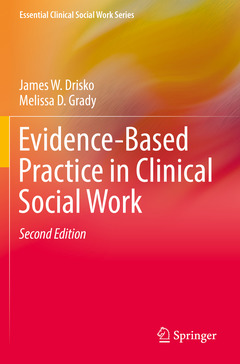Evidence-Based Practice in Clinical Social Work (2nd Ed., 2nd ed. 2019) Essential Clinical Social Work Series
Auteurs : Drisko James W., Grady Melissa D.

The second edition of Evidence-Based Practice in Clinical Social Work continues to bridge the gap between social work research and clinical practice, presenting EBP as both an effective approach to social work and a broader social movement. Building on the models and insights outlined in the first edition, this new edition provides updated research and additional case studies addressing relevant issues such as trauma treatment and opioid dependence.
Drawing on their multidisciplinary experience as practitioners, researchers, and educators, the authors guide readers through the steps of the EBP decision-making process in assessment, treatment planning, and evaluation. The book places special emphasis on balancing clinical expertise, research results, and client needs, and analyzes both the strengths and limitations of the EBP model in order to give readers a more complete idea of how the method will shape their own practice.
In addition, this practice-building reference:
- Introduces core principles of EBP and details its processes in social work
- Features guidelines for engaging clients in EBP and transmitting research findings
- Offers a range of case examples demonstrating EBP with diverse clients
- Addresses education and supervision issues and related controversies
- Includes an expanded glossary and valuable resources for use in evidence-based practice
Evidence-Based Practice in Clinical Social Work is a practical resource for clinical social work professionals and educators that broadens the field and expands the healing possibilities for the profession.
I. What is Evidence-Based Practice and How It Influences Clinical Practice- Introduction and Overview.- Three Perspectives on Evidence-Based Practice.- The Steps of EBP in Clinical Practice: An Overview.- Step 1 of EBP: Assessment in Clinical Social Work and Identifying Practice Information Needs.- Step 2 of EBP: Locating Practice Research.- Step 3 of EBP - Part 1: Evaluating Research Designs.- Step 3 of EBP - Part 2: Evaluating Research Methods.- Step 3 of EBP - Part 3: Meta-Analysis and Systematic Reviews: Aggregated Research Results.- Step 4 of EBP: Collaboratively Discussing Treatment Options with the Client.- Steps 5 and 6 of EBP: Finalizing the Treatment Plan and Practice Evaluation.- II. Case Examples of Evidence-Based Practice.- Sam: An Older, Gay Man Who Appears Depressed.- Ray: A Man Fearful of Panic Attacks.- Sally: A 12-Year-Old Who May Have Disinhibited Social Engagement Disorder.- Newman and Loretta: Parents of Arthur, A Man Who Has Schizophrenia.- Jin: A 16-Year-Old Korean-American Male with Drinking Issues.- Jennifer: A Young Homeless Woman Who Has Borderline Personality Disorder.- Bethany: A Young Woman Recalling her Traumatic History.- Gabrielle: A Young Woman in Pain who is Opioid Dependent.- III. EBP in Clinical Social Work Education and Ongoing Issues.- Evidence-Based Practice: Teaching and Supervision.- Continuing Issues Regarding EBP in Practice.- Conclusion: The Evidence for Evidence Based Practice.- Glossary.- Appendix A: An Outline for a Biopsychosocial Assessment and Intervention Plan.- Appendix B: A Bullet Point Summary of the Merits and the Limitations of EBP.
Expands on previous research used to develop practice guidelines
Explores practical and ethical challenges of EBP
Provides updated case studies to illustrate applications and examine relevant contemporary social issues
Date de parution : 08-2020
Ouvrage de 348 p.
15.5x23.5 cm
Disponible chez l'éditeur (délai d'approvisionnement : 15 jours).
Prix indicatif 68,56 €
Ajouter au panierDate de parution : 06-2019
Ouvrage de 348 p.
15.5x23.5 cm
Thèmes d’Evidence-Based Practice in Clinical Social Work :
Mots-clés :
Assessment in clinical social work; Case examples of evidence-based practice; Clinical social work; Decision-making with social work clients; EBP in social work practice; Evidence-based practice; Evidence-based practice in social work; Finalizing a social work treatment plan; Social work research; Teaching EBP; Treating reactive attachment disorder



